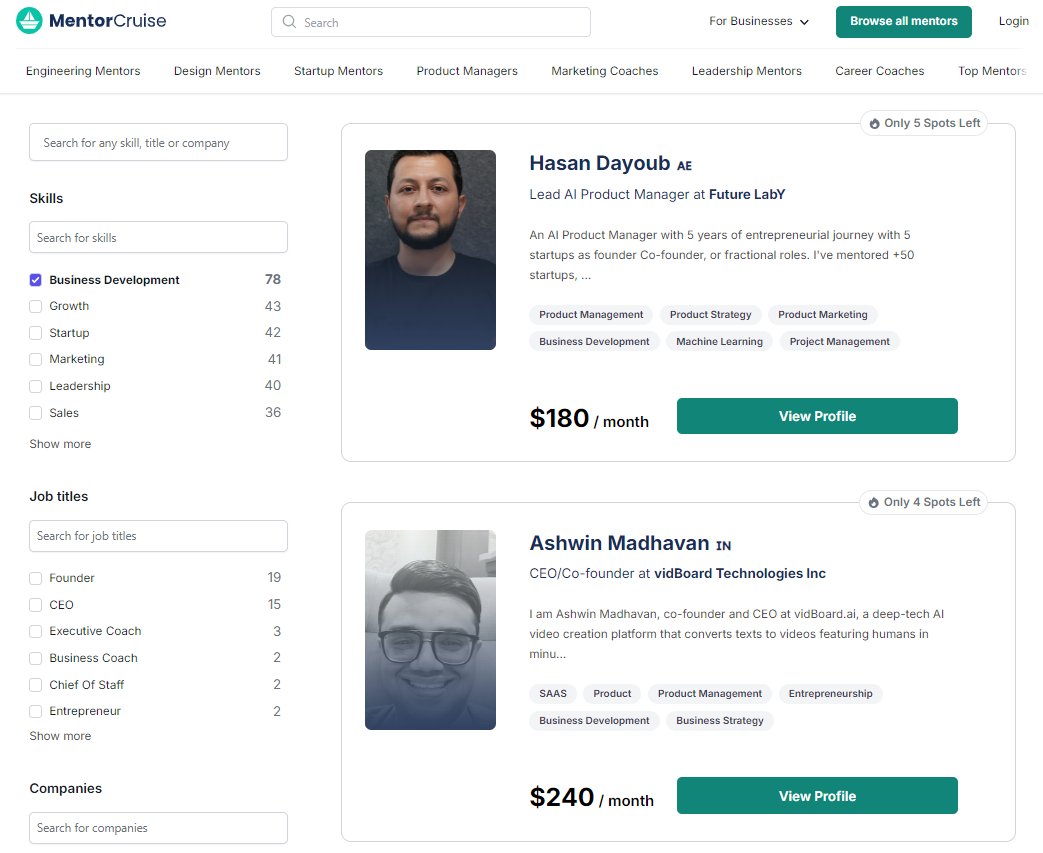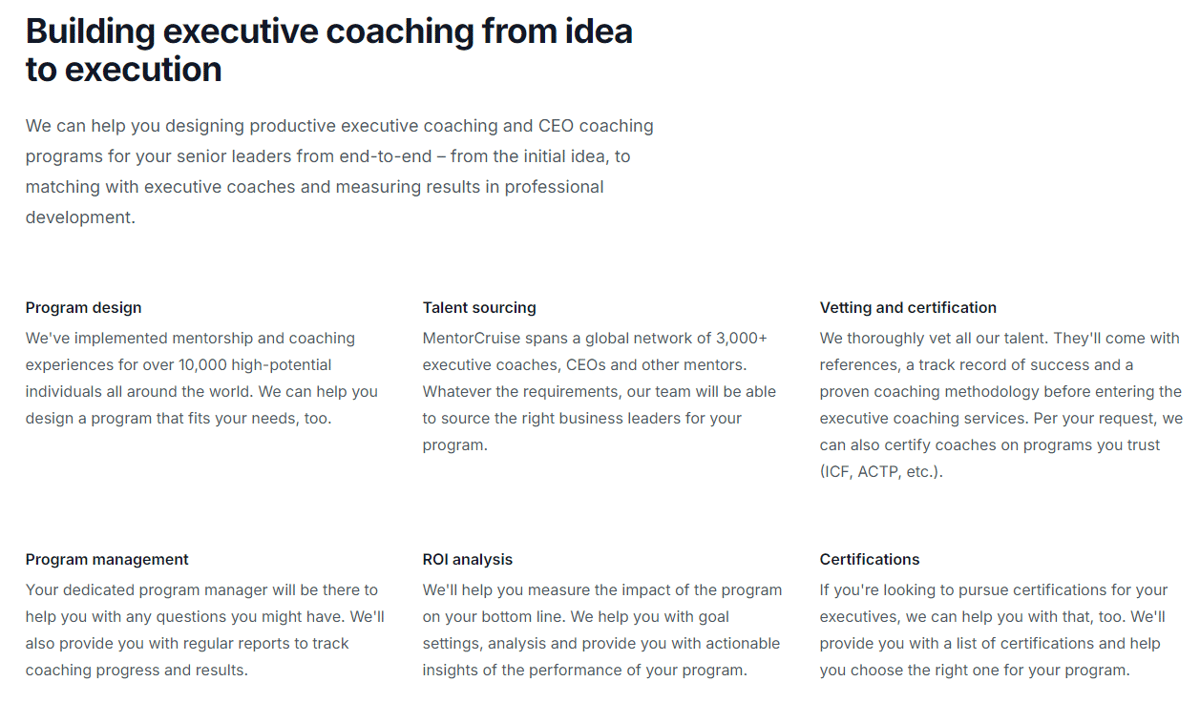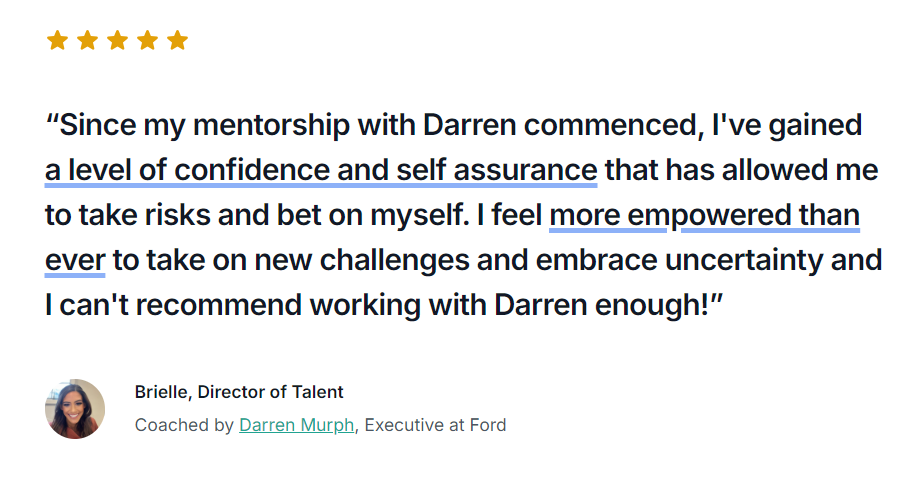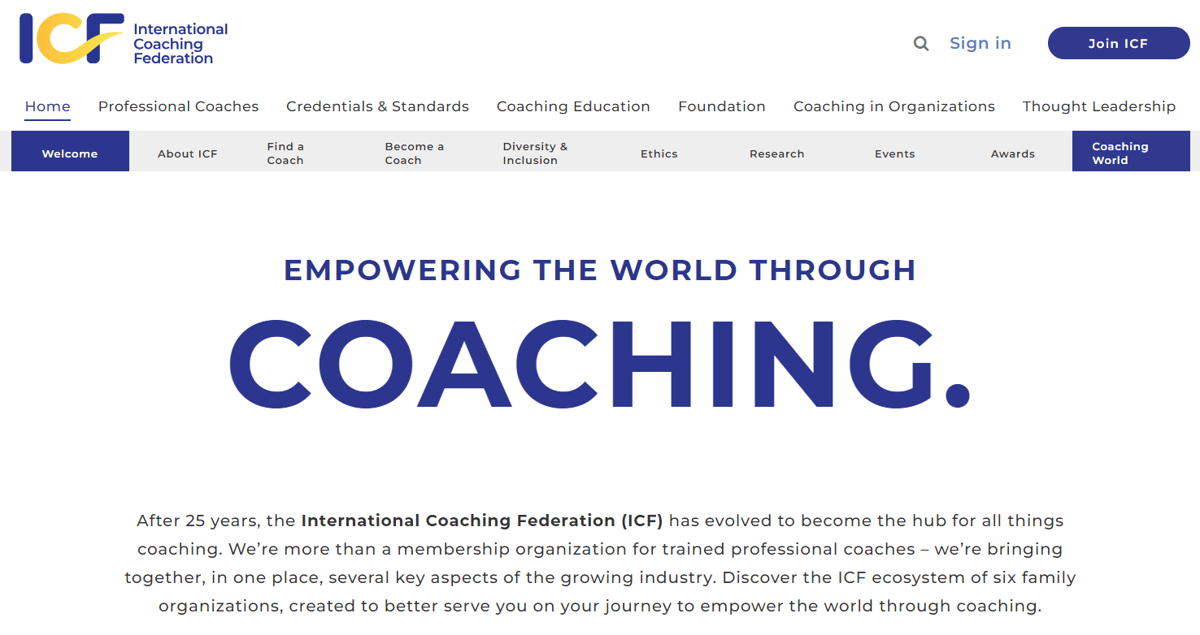As a business development coach, you have the chance to help these businesses overcome their challenges. You’ll be guiding them through complex problems, helping them grab new opportunities, and making a real difference in their growth and success.
Plus, it’s a career that’s not only rewarding but also lets you grow personally and professionally.
So, how can you stand out in a crowded market and ensure your services are sought after? Let’s dive in and explore the path to becoming the best business development coach.
What is a business development coach?
A business development coach is an expert who helps business owners and leaders develop strategies for growth and success. They help in creating long-term value through customers, markets, and relationships. Unlike a general business coach, a business development coach focuses specifically on growth opportunities and how you can achieve them.
At MentorCruise, we offer some of the best business development coaches to help professionals and entrepreneurs grow faster. With extensive experience in various industries, our coaches can give you personalized advice that fits your needs.

By working with our business development coaches, you can get 1-on-1 mentorship, learn the best practices, and build important skills that a coach must have.
Examples of business development coaching
- Strategic planning: Helping a startup identify market opportunities and develop a five-year growth plan.
- Market expansion: Assisting a mid-sized company in entering new markets and expanding its customer base.
- Leadership development: Coaching a CEO to enhance leadership skills and create a growth-oriented company culture.
For fractional leadership and strategy services, consider fractional executives provided by MentorCruise.
Different types of business coaches
Business coaching covers various specialties, each focusing on different aspects of business growth and development.
Marketing coach vs. business development coach
- Marketing coach: Promotes products and services, identifies target audiences, and creates marketing strategies.
- Business development coach: Builds long-term relationships, expands market reach, and develops sustainable growth strategies.
Example: A marketing coach might help a company boost its social media presence, while a business development coach helps build key partnerships to boost the company's presence in the market.
Executive coach vs. business development coach
- Executive coach: Improves individual leadership skills, decision-making abilities, and personal development.
- Business development coach: Works on broader company strategies, including market analysis, product development, and growth plans.
Example: An executive coach might help a CEO improve communication skills, while a business development coach would help in creating a comprehensive growth strategy.
At MentorCruise, we offer executive and CEO coaching to help you hone your skills, identify blind spots, and manage teams more effectively.

We provide tailored program designs, source talent from a global network of over 3,000 vetted coaches, and offer program management and ROI analysis. You can choose self-service options starting at $350/month or customized programs.

Our coaches are highly qualified, many with industry certifications, supporting long-term coaching for meaningful growth.
Why business development coaching is important
In today’s competitive market, business development coaching is essential for:
- Strategic growth: Coaches can help businesses identify and capitalize on growth opportunities.
- Accountability: Regular sessions with a coach can ensure that business owners stay on track with their goals.
- Expert guidance: Coaches can bring a wealth of experience and knowledge, providing valuable insights and strategies.
Example
A business development coach can guide a small business owner through the process of scaling operations, ensuring they make informed decisions and avoid common pitfalls.
Another incredible example is Hon Tjuin, who enhanced his UX design skills with guidance from his mentor James on MentorCruise. By learning personalized training, accountability, and gaining real-life experience, James turned Hon Tjuin into a valuable asset for his new business.
How to become a business development coach
Becoming a successful business development coach involves several key steps. Let's break them down:
Step 1: Gain relevant experience
Start by gaining experience in business development roles. You can expand your skills in strategic planning, market analysis, and relationship building by working in sales, marketing, or management positions.
Hands-on experience in these areas will give you a strong foundation for your coaching practice.
Diverse experience
Consider roles that offer diverse responsibilities.
Example: Working as a sales manager can provide valuable insights into customer acquisition and market expansion strategies. You'll learn how to set sales targets, develop incentive plans, and analyze sales data to look for growth opportunities.
Understand market dynamics
Marketing experience can help you understand market dynamics, consumer behavior, and promotional strategies. These skills are crucial when advising businesses on how to put their products and services out in the market.
Example: In a marketing role, you can conduct market research, develop marketing campaigns, and analyze their performance. This will guide your clients in creating effective marketing strategies that drive growth.
Leadership roles
Management positions offer the opportunity to develop leadership and strategic thinking skills. These roles often involve making high-level decisions, managing teams, and steering the company towards its goals.
Example: As a product manager, you might oversee the development of new products, coordinate with different departments, and manage the product life cycle. This can help you understand how to guide businesses through product development and market introduction processes.
Step 2: Get certification
While certification is not mandatory, it can enhance your credibility and show your commitment to the profession. Certification programs provide structured training and ethical guidelines that can set you apart.
Choose the right certification
Look for programs offered by reputable organizations such as the International Coach Federation (ICF) or other recognized institutions. They cover essential coaching skills, ethical standards, and best practices in business development coaching.

Example: The ICF offers different certification programs where you can develop a comprehensive understanding of coaching principles and methodologies.
Benefits of certification
Certification can give you access to a network of professional coaches, ongoing education opportunities, and a credential that potential clients can trust.
Example: By becoming a certified business development coach through the ICF, you gain access to a global community of similar coaches, which can provide support, resources, and opportunities for collaboration. This network can be invaluable as you grow your coaching practice.
Step 3: Build your network
Networking is crucial in this field. Build a strong professional network to stay updated on industry trends, gain referrals, and find collaboration opportunities.
Attend industry conferences
Industry conferences are excellent for meeting other coaches, business leaders, and potential clients. They feature workshops, seminars, and networking sessions that can help you build valuable connections.
Join professional organizations
Joining professional organizations related to coaching can help you access resources, professional development opportunities, and a community of peers.
Leverage social media
Social media platforms, especially LinkedIn, are powerful tools for networking. Join LinkedIn groups related to business coaching to stay updated on industry trends and connect with potential clients.
Example: Participating in LinkedIn groups focused on business development lets you share your expertise, engage in discussions, and build relationships with other professionals in your field.
Step 4: Develop a strong online presence
In today's digital age, a strong online presence can attract clients and establish your credibility. Your online presence should reflect your expertise and professional approach.
Create a professional website
A professional website is a cornerstone of your online presence. It should have details about your services, credentials, and testimonials from past clients.
A well-designed website can make a strong first impression, giving your potential clients the information they need to choose you.
Example: Your website could feature case studies about how you helped previous clients achieve their business development goals. These can show how you deliver results and build trust.
Make use of social media
Social media platforms are powerful tools for building your brand and engaging with your audience. Share valuable content, such as blog posts, case studies, and testimonials, to show your expertise.
Example: Write a blog post on how strategic partnerships impact business growth. Share it on LinkedIn and Twitter to boost your visibility and reach a broader audience.
Leverage content marketing
Content marketing involves creating and sharing content to drive traffic and engage your target audience. This includes blog posts, videos, webinars, and ebooks.
Example: Create a series of blog posts providing actionable tips on business development strategies. Offering a free ebook in exchange for email sign-ups can help you build your email list and nurture potential clients.
Step 5: Offer pro bono services
Initially, offering your business development coaching services for free or at a reduced rate can help you build your portfolio and gain testimonials. This strategy works well when you’re starting out and need to show your value.
Identify potential clients
Look for startups, non-profits, or small businesses that can benefit from your services but are unable to afford full rates. Offering your services to these organizations can give you a one-of-a-kind experience and get you positive testimonials.
Example: Coaching a local startup for six months can get you positive reviews to show on your website. These can help you build credibility and attract paying clients in the future.
Gain testimonials
Request feedback from your pro bono clients. Positive feedback can be powerful in building your reputation.
Example: After completing a pro bono coaching engagement, ask the client to provide a detailed review highlighting how your coaching helped their business growth. Put these testimonials up on your website and marketing materials.
Build your portfolio
Use your pro bono work to build a portfolio of case studies and success stories. This can demonstrate your ability to deliver results and provide potential clients with tangible evidence of your expertise.
Example: Create a case study that outlines how your coaching helped a pro bono client hit a certain milestone. Include specific metrics, such as revenue increases or market expansion, to highlight how effective your coaching was.
Best practices for business development coaches
To excel as a business development coach, stick to these best practices:
- Continuous learning: Stay updated on industry trends and new coaching methodologies.
- Client-centered approach: Focus on the unique needs and goals of each client.
- Measurable goals: Help clients set clear, achievable goals and track progress regularly.
- Ethical standards: Maintain high ethical standards and confidentiality in all coaching engagements.
Resources to boost your career as a business development coach
Books
- "The Business Coaching Handbook" by Curly Martin
- "Coaching for Performance" by John Whitmore
- "The Prosperous Coach" by Steve Chandler and Rich Litvin
Podcasts and videos
- "The Business Couch with Dr. Yishai"
- "The Tony Robbins Podcast"
- YouTube Channel: "Brian Tracy - Business Success and Personal Development"
Online courses
- Coursera: "Business Strategy"
- Udemy: "Life Coaching Certificate Course (Beginner to Advanced)"
- LinkedIn Learning: "Business Development Foundations"
How to understand client needs as a business development coach
One of the key aspects of being a successful business development coach is understanding your clients' needs and goals. This involves active listening, asking insightful questions, and using tools like SWOT analysis.
1. Active listening and communication skills
Active listening is more than just hearing your clients— it’s about understanding their concerns and aspirations deeply. Use open-ended questions so that your clients can express themselves fully.
Example: Instead of asking, "Are you happy with your current market position?" ask, "What challenges and opportunities do you see in your current market position?"
2. Use SWOT analysis
A SWOT analysis helps clients see the big picture and make informed decisions. Guide them through the process by asking them to list their strengths, weaknesses, opportunities, and threats.
Example: You can help a client identify their strong brand reputation as a strength, lack of market research as a weakness, a growing market for their products as an opportunity, and increasing competition as a threat.
How to develop a business development coaching plan
A structured coaching plan can yield consistent guidance. This should outline the coaching objectives, methods, timelines, and evaluation metrics.
1. Set clear objectives
Work with your clients to set SMART (Specific, Measurable, Achievable, Relevant, Time-bound) goals to keep the coaching sessions focused and productive.
Example: Instead of a vague goal like "increase sales," a SMART goal would be "increase sales by 20% in the next quarter through targeted marketing strategies."
2. Choose coaching methods
Different clients might benefit from different coaching methods, such as one-on-one sessions, group workshops, or online webinars. Tailor your approach to suit each client's needs.
Example: A startup might benefit from regular one-on-one sessions, while a larger company might find group workshops more effective for team building and strategy alignment.
3. Set timelines and evaluation metrics
Set a timeline for achieving objectives and define metrics to evaluate progress. Regularly review these metrics with your clients to make sure they stay on track.
Example: If the goal is to expand into a new market, set milestones for market research completion, initial customer acquisition, and revenue targets.
Technology to use in business development coaching
Incorporate technology into your coaching practice to boost your efficiency. Use tools like video conferencing, project management software, and data analytics to gain maximum benefits.
1. Video conferencing tools
Platforms like Zoom, Microsoft Teams, and Google Meet allow you to conduct sessions remotely, easily connecting with clients regardless of location.
Example: Use Zoom for weekly check-ins with clients to discuss progress and address any issues they might be facing.
2. Project management software
Tools like Trello, Asana, and Monday.com help you and your clients stay organized and track progress on various tasks and projects.
Example: Set up a Trello board to manage a client's business development projects, assigning tasks, setting deadlines, and tracking progress.
3. Data analytics
Use data analytics tools to provide insights into market trends, customer behavior, and business performance to make data-driven decisions.
Example: Use Google Analytics to track website traffic and user behavior, helping your client understand which marketing strategy is working the best.
How to build your brand as a business development coach
Your brand is what sets you apart from other coaches. Here’s how:
1. Define what makes you special
Identify what makes you unique as a business development coach. This could be your experience, approach, success stories, or a combination of these.
Example: If you have extensive experience in the tech industry, position yourself as a specialist in coaching tech startups.
2. Create a professional online presence
Your website is often the first point of contact for potential clients. Make sure it is professional, easy to navigate, and has all the information about your services, credentials, and testimonials.
3. Promote your services
Use different marketing strategies such as content marketing, social media, email marketing, and speaking engagements to promote your services.
Example: Write articles on LinkedIn about business development strategies and share them with your network to set yourself up as an authority in your field.
How to continually evolve as a business development coach
The business environment is constantly developing, and so should you to stay relevant and effective as a coach.
1. Participate in workshops and conferences
Attend workshops, seminars, and conferences related to business development and coaching. These provide valuable learning and networking opportunities.
2. Earn advanced certifications
Consider earning advanced certifications in coaching and business development to add to your skills and credibility.
Example: Pursue an Advanced Certificate in Executive Coaching from a recognized institution.
3. Stay updated with industry trends
Regularly read industry publications, follow thought leaders, and participate in online forums to keep up with the latest trends and challenges in business development.
Example: Subscribe to newsletters from Harvard Business Review and McKinsey & Company to receive insights on business strategy and development.
How to measure your success as a business development coach
To provide value to your clients and keep improving, it's important to measure your success.
1. Get client feedback
Regularly seek feedback from your clients about your business development coaching methods, their progress, and the overall experience.
Example: Send out anonymous surveys at the end of each coaching engagement to gather honest feedback and identify areas for improvement.
2. Track client success
Monitor the progress of your clients and their businesses to see how your coaching is impacting them. Use key performance indicators (KPIs) to measure success.
Example: Track metrics such as revenue growth, market expansion, and client satisfaction.
3. Self-reflect and improve
Regularly reflect on your coaching practice and see where you can improve. Consider working with a mentor or coach yourself to gain new perspectives and skills.
Example: Set aside time each quarter to review your coaching methods, read new coaching literature, and implement any necessary changes.
Common challenges faced by business development coaches
Every profession comes with its challenges, and business development coaching is no different. Figuring out these challenges and knowing how to tackle them is key to succeeding.
1. Resistance to change
Clients may be resistant to change, especially if it involves altering long-standing business practices. You need to be patient, empathetic, and effectively communicate while dealing with such a client.
Example: When working with a client who is hesitant to adopt new technology, focus on demonstrating the long-term benefits and providing step-by-step guidance.
2. Balancing multiple clients
Managing multiple clients can be challenging in terms of time management and maintaining the quality of your services. Prioritize your tasks and use efficient scheduling tools to stay on top.
Example: Use a calendar app like Google Calendar to schedule coaching sessions and set reminders for tasks and deadlines.
The Future of business development coaching
Knowing the right strategies for the future will keep you ahead in this business coaching world. These are some vital assets you need to keep as a treasure whiles we progress in the future:
1. High demand for digital transformation
With the rise of digital technologies, businesses will increasingly look for coaches who can guide them through digital transformation processes.
Example: Equip yourself with knowledge about digital marketing, e-commerce, and data analytics to help clients navigate the digital landscape.
2. Focus on sustainable business practices
Sustainability is becoming a critical focus for businesses. You will be in high demand if you can help companies develop and implement sustainable practices.
Example: Learn about sustainable business models and green certifications to advise clients on how to fuse sustainability with their operations.
3. Emphasis on mental health and well-being
People are starting to realize how important it is to take care of mental health and well-being at the workplace. Business development coaches who can address these areas will be highly valued.
Example: Consider earning certifications in workplace wellness and mental health first aid to support your clients.
Start your journey of becoming a business development coach with MentorCruise
Becoming a successful business development coach involves a combination of experience, continuous learning, and a deep understanding of client needs.
Start your journey today with the support of resources such as MentorCruise, your go-to platform for finding the coach you need to establish yourself as a trusted and effective business development coach.







